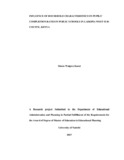| dc.contributor.author | Kanoi, Simon, W | |
| dc.date.accessioned | 2017-11-27T11:10:59Z | |
| dc.date.available | 2017-11-27T11:10:59Z | |
| dc.date.issued | 2017 | |
| dc.identifier.uri | http://hdl.handle.net/11295/101435 | |
| dc.description.abstract | Education has many benefits to both individuals and societies at large. The problem however is when one does not complete a designated cycle or level that can enable one to be literally functional. Therefore, the purpose of this study was to investigate the influence of household characteristics on pupils’ completion rates in public primary schools in Laikipia West Sub-County, Kenya. Four research objectives were formulated to guide the study; to determine the influence of parental level of education, household incomes, household size and child labour on pupils` completion rate in public schools in Laikipia West Sub-County. The study adapted the descriptive survey design. The sample size was 25 head teachers, 70 class teachers and 265 pupils. Data was collected by use of questionnaires and interview guide and analyzed by use of descriptive statistics. Findings revealed that parental level of education affected pupils` completion rate Head teachers agreed that parents with low level of education did not value the importance of education of their children. They therefore did not motivate their children in school to enhance their completion thus leading to some dropping out. Class teachers strongly agreed that children from households with high earnings completed primary schooling than those from low income households. Findings on the influence of pupils’ household size on completion rate among primary school pupils revealed that household size contributed to pupils` completion rates. Head teachers indicated that in big households, parents strain to care for their children and some pupils leave school to work in order to support their siblings. Findings revealed that child labour influenced pupils` completion rates. Based on the findings of the study, it was concluded that the parental level of education affected pupils’ completion rates in public schools. Pupils whose parents have low level of education lack role models and result to low completion rates. In addition, it was also concluded that households` size influences pupils` completion in public schools. The researcher further concluded that child labour influences pupils’ completion rates in public schools. Based on the findings of the study it was recommended that the government should look for ways to eradicate poverty. The government should enforce adherence of laid down policies and procedures such as repetition and the compulsory free primary education. The government should boost and streamline adult education to help improve on the literacy level among parents. The researcher suggested that a comparative study can be conducted in other sub-counties to assess how the household characteristics are influencing pupils` completion rates in those sub-counties. There is need to carry out a study and establish how other factors influence pupils` completion rates. | en_US |
| dc.language.iso | en | en_US |
| dc.publisher | University of Nairobi | en_US |
| dc.rights | Attribution-NonCommercial-NoDerivs 3.0 United States | * |
| dc.rights.uri | http://creativecommons.org/licenses/by-nc-nd/3.0/us/ | * |
| dc.subject | Influence of Household Characteristics on Pupils’ Completion Rates in Public Schools in Laikipia West Sub-county, Kenya | en_US |
| dc.title | Influence of Household Characteristics on Pupils’ Completion Rates in Public Schools in Laikipia West Sub-county, Kenya | en_US |
| dc.type | Thesis | en_US |



